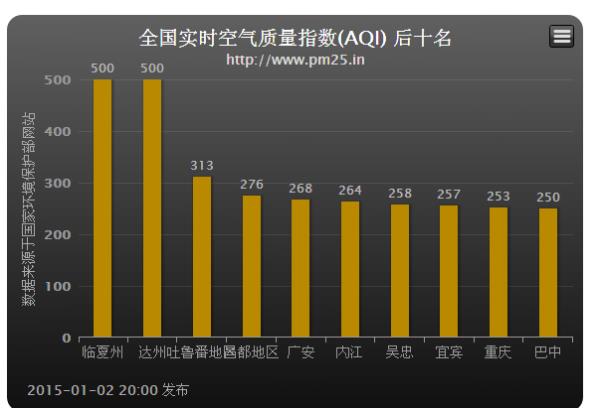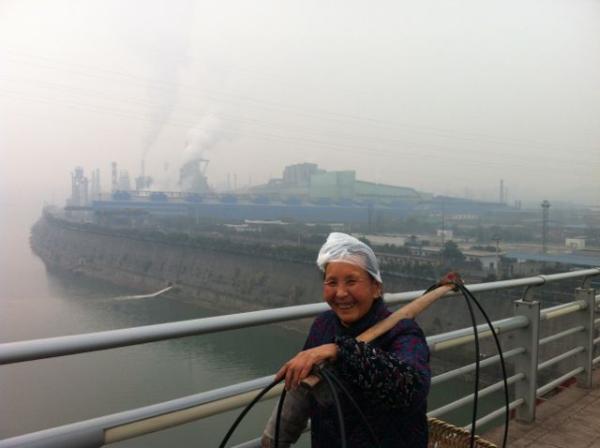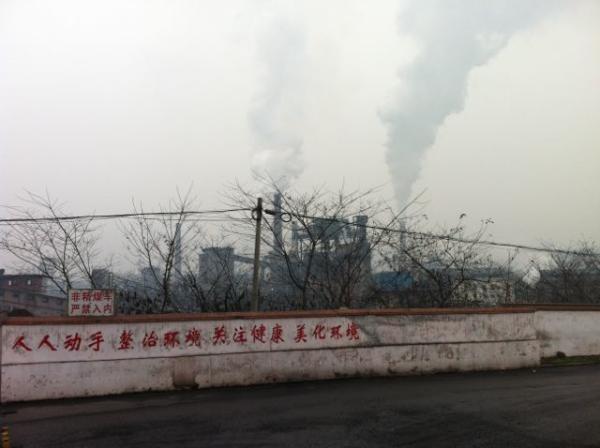

At 1: 00 noon on January 24, from the Phoenix Mountain in the north of Dazhou, Dazhou City, Sichuan Province is like being immersed in a foggy bathhouse. According to the real-time data of the Ministry of Environmental Protection, the AQI of Dazhou is 343, and the PM2.5 is 270, both of which are serious pollution.
After Dazhou vigorously rectified smoked bacon for half a month, the smell of bacon has disappeared in the main city, but the air pollution is still serious.
On January 4th, the local media in Dazhou published a report that smoked bacon was the main cause of smog. After online fermentation, this little-known small town in eastern Sichuan was put in public opinion. Some netizens feel that every city’s PM2.5 has its own taste, while Dazhou is bacon.

Dazhou iron and steel prospect. The Paper reporter Zhao Mengtu
The uproar of public opinion has obscured two essential questions: Why did the unknown Dazhou suddenly become a "polluted town"? What is the main cause of air pollution?
A background is unavoidable. From January 1, 2015, Dazhou began to release AQI (air quality index) and PM2.5 (fine particulate matter) data according to the new Ambient Air Quality Standard adopted in 2012. Just like looking at a demon mirror, the new standard exposes these cities that have been polluted for many years and have not been included in the evaluation system of the new standard to the public.
The Paper (www.thepaper.cn) visited and compared a number of monitoring data, and found that a key enterprise with high energy consumption and high pollution, Dazhou Iron and Steel Group (hereinafter referred to as Dagang), was hidden behind the smoke of smoked bacon, which was generally considered as the culprit of air pollution in Dazhou.
Dagang has been rooted in Dazhou for more than 50 years, and the annual tax contribution of hundreds of millions accounts for one-third of the city’s finance. However, its pollution over the years has also become a "heart disease" from the secretary of the municipal party Committee to the ordinary citizens.
If every city’s PM2.5 has its own flavor, then Dazhou is definitely not bacon flavor, but steel flavor.
Dazhou Environment Exposed under New Environmental Standards
The theory of "smoked bacon" originated from Dazhou Evening News. On January 4th, Dazhou Evening News published a report with the subtitle "Environmental protection department investigates the source of pollution, and citizens smoked bacon is the main reason", which was later reprinted by several websites.
The Paper reporter inquired about the test data released by the Ministry of Environmental Protection, and found that Dazhou was heavily polluted on January 1, and the pollution continued to increase on January 2. At 8 o’clock that night, AQI soared to 471, ranking the second lowest in the country, which was a serious pollution level. At the same time, PM2.5 soared to 526 (the one-hour average of all monitoring points), and the monitoring icon was darkened, which means that the monitoring data has been off the charts (that is, beyond the range of the conventional air quality index table).
It is worth mentioning that on June 1, 2014, Dazhou began to implement the new Ambient Air Quality Standard, and the form of air quality monitoring and evaluation has entered the era of air quality index (AQI) from the era of air pollution index (API). Its biggest highlight is that three monitoring contents including PM2.5 have been added.
On December 30, 2014, the Ministry of Environmental Protection announced that from January 1, 2015, 1,436 monitoring points in 338 cities above the prefecture level in China will all carry out the monitoring of new air quality standards, and the monitoring data will be published in real time. Dazhou ranks among 338 cities.
According to public data, the air quality released by Dazhou Environmental Protection Bureau was mostly excellent or good before the new standard data was released. An official of Dazhou Environmental Protection Bureau, who asked not to be named, said that the previous monitoring of particulate matter was PM10 (that is, inhalable particulate matter), and the monitoring data obtained were ideal because of its relatively low concentration.
Zhang Yi, head of the Law and Publicity Department of Dazhou Environmental Protection Bureau, told The Paper that in order to cope with the relatively stringent new standards, many construction sites in Dazhou were required to stop work from the end of December 2014. "All law enforcement officers were out patrolling every day in those days."
The new standard looks like a mirror, exposing the environmental ills that have been hidden for many years. The day after the new standard monitoring data was released, Dazhou PM2.5 was already in off the charts.
On January 3rd, the environmental protection departments of Dazhou City and District jointly investigated the pollution sources. In a TV program, Rao Bing, deputy director and spokesperson of Dazhou Environmental Protection Bureau, made an analysis. There are three main reasons for air pollution. One is the smoke and dust emitted by pollutants from surrounding industrial enterprises, the other is the dust from road transportation and construction, and the third is the unfavorable meteorological conditions after entering winter, which makes pollutants difficult to dilute, spread and degrade. Rao Bing then added, "In addition, it is now the season of smoked bacon, and the general public does not regulate smoked bacon, which has aggravated the pollution of air quality."
However, the Dazhou Environmental Protection Bureau has always remained silent about the popular saying that "Dazhou believes that smoked bacon causes smog". Rao Bing, deputy director of the bureau, replied to the The Paper reporter that he had been interviewed by local TV stations several times and "never said that smoked bacon was the main cause of smog". In addition, he has never been interviewed on this matter, and the main reason is unknown.
Regarding why he didn’t choose to rumor, Rao Bing explained that "the more he explains, the more unclear he is."
Break the smoking stove with a hammer.
Data off the charts makes Dazhou environmental protection department "on pins and needles". "In those days, we became the Environmental Protection Bureau on the tip of our tongue, and everyone was talking about it, and we couldn’t even sleep," said a person in charge of the pollution prevention department of Dazhou Environmental Protection Bureau.
Under the pressure of public opinion, Dazhou environmental protection joint urban management and other departments began to rectify the phenomenon of illegal bacon smoking and closed a number of bacon smoking factories. In the program of local TV station, law enforcement officers smashed the smoking stoves built by some residents privately with hammers.
To this end, Dazhou has specially planned eight centralized smoked bacon points, but because of the remote location and the need to charge, there are few people. The person in charge of the pollution prevention department said frankly that this work was opposed by many citizens and was often abused. Even in the process of persuasion, a law enforcement officer clashed with the citizens and his finger was broken.
During an interview with The Paper, the person in charge pointed to a smoking floor opposite the Environmental Protection Bureau, saying that someone was smoking bacon again, and called a person in charge of Dazhou Urban Management Bureau face to face to coordinate the investigation.
On January 26th, the reporter from The Paper visited Dazhou City, but he couldn’t see the privately built smoking point, nor did he see the publicly sold smoking materials such as Boya, which were everywhere in previous years. The rectification action drove away the smell of bacon, but it did not fundamentally reverse the reality of air pollution in Dazhou.
As of January 29th, there were 18 days of severe and above pollution in Dazhou in January, including 3 days of severe pollution. The environmental protection department, which has nothing to do, can only turn to artificial rainfall. According to the data of the Ministry of Environmental Protection, the air quality in Dazhou was good on January 6 and January 7, during which artificial rainfall was implemented in Dazhou.
However, after the rain cleared, AQI began to climb again and maintained heavy pollution.
According to the analysis of the officials of Dazhou Environmental Protection Bureau, smoked bacon will push up PM2.5, but the impact is not great. The air pollution in Dazhou is related to the urban population, motor vehicles and the geographical environment surrounded by mountains and poor air circulation.
A "heart disease" from official to folk
A number of officials from Dazhou Environmental Protection Bureau told The Paper that the smog weather is the result of various factors including smoked bacon, and as for the proportion of each factor, the source of pollutants needs to be analyzed. Because Dazhou does not have such hardware conditions, it is impossible to give an accurate answer.
However, the head of the Bureau’s Pollution Prevention Division told The Paper that "the main reason is industrial pollution". In Dazhou, the key industrial enterprise is Dagang, the largest high-energy and high-pollution enterprise near the main city. In fact, the air impact of Dagang on Dazhou has long been a "heart disease" from the official to the private sector.
According to public information, Dagang covers an area of nearly 2,000 mu, with more than 7,000 employees and an annual output of 3.5 million tons of pig iron. The waste gas pollutants emitted by Dagang mainly include soot, sulfur dioxide, nitrogen oxides and so on. These three pollutants are the main indicators referenced by AQI, and smoke and dust are the main monitoring objects of PM2.5
Dagang was founded in 1958, which was the era of "steel refining" in China. Dagang was the first enterprise with an annual output value of over 10 billion in Dazhou, and its tax contribution accounted for more than 50% of the city’s fiscal revenue at its peak. Many years ago, Dazhou people were proud of their work in Jinda Steel, but with the extension of the city scale, their pollution problems are increasingly causing dissatisfaction.
On the afternoon of January 25th, a reporter from The Paper came to Dagang Park in the western area of Dazhou. It is adjacent to the Zhouhe River, and there are many buildings and commercial areas nearby. The huge chimneys vomit white smoke, slowly rising into the air and gradually spreading out, which is even with the gray sky. The data shows that the air quality in Dagang area is obviously worse than that in other surrounding areas.
At present, there are 6 air quality monitoring points in Dazhou, among which Dazhou Vocational and Technical College, Municipal Environmental Monitoring Station, Municipal Center, Daxian Government Hotel and Fenghuang Community have all been incorporated into the monitoring network of the Ministry of Environmental Protection.
The monitoring point of the municipal center is next to Dagang. The multi-day data of five monitoring points show that the AQI and PM2.5 of the municipal center monitoring point are generally higher than those of other monitoring points, and show a trend of higher at night than during the day. Previously, some villagers questioned the existence of smuggling in Dagang. "White smoke comes out during the day, sometimes it turns yellow at night, and blue fire comes out of the chimney."
At 2 pm on January 25, The Paper reporter observed near the west gate of Dagang. At that time, the PM2.5 at the monitoring point of the municipal center was 203, and the PM2.5 at the other four points was below 200; At 0: 00 a.m. on January 26th, the reporter came to the same place again and obviously felt a pungent smell. A chimney in Dagang Park spewed blue flames. At this time, the PM2.5 of the municipal center monitoring point is 291, which is also higher than the other four monitoring points.
The data also showed that at 8: 00 pm on January 2, when PM2.5 was in off the charts, among the five monitoring points, the eight-hour average values of PM2.5, PM10, nitrogen dioxide, sulfur dioxide and ozone at the municipal center monitoring point were higher than those at the other four monitoring points. Among them, PM2.5 is as high as 685 and PM10 is as high as 917.
In Linjiang Village, opposite the Dagang Industrial Park, a huge roar surrounded the village. A villager said that as early as a few years ago, the pollution was more serious, "every day is like shooting." Nowadays, the smoke is still very heavy. "The washed clothes are afraid to hang outside, and they have to be washed again after drying." He didn’t want to be named because his relatives worked in Dagang.
"It is also the biggest headache for us, with the most complaints every year." Zhang Yi told The Paper that last year, Dagang was fined 70,000 yuan for illegal sewage discharge.
Dagang’s sewage discharge was named by the Ministry of Environmental Protection.
An insider of Dagang told The Paper that in order to save the cost of purification equipment, there was an illegal discharge at night. However, Wang Huaiyun, chairman of Dagang Group, declined The Paper’s interview on the phone, and many staff members of Dazhou Environmental Protection Bureau also denied it. "When we went to check, all its emissions were up to standard."
In May 2010, the Ministry of Environmental Protection published a list of regions and enterprises with outstanding problems in urban sewage treatment, construction and operation of desulfurization facilities, and Dagang was among them.
According to Dazhou Evening News, on April 17, 2014, the interview team of Dazhou Environmental Protection Century Bank found near Gexi Bridge in Xiwai Town, Tongda, that a subsidiary of Dagang failed to meet the standards in the production process, resulting in serious environmental pollution. "Yellow smoke billowed into the sky, and the whole factory was shrouded in smoke".
Dazhou Environmental Protection Bureau also admitted that there is still a gap between the air near Dagang and the expectations of the public. Zhang Yi told The Paper that meeting the discharge standards does not mean that there is no pollution at all, and the environmental protection department can only deal with its illegal discharge and over-discharge.
"There is no other way except to move." Zhang Yi said.
In fact, the call for the relocation of Dagang has been around for a long time, and the surrounding villagers told The Paper that "they said they would move decades ago".
On January 11th, 2011, He Jian, then mayor of Dazhou, told reporters that in 2010, we made a very difficult decision: the newly revised Dazhou master plan decided to relocate Dazhou Iron and Steel Company from Dazhou city to industrial park in about 10 years, and to provide a clean environment for Dazhou people.
In 2013, Dazhou listed the relocation and transformation project of Dagang as one of the 25 major projects in the city, and issued the Work Plan for Promoting the Relocation and Transformation of Dagang Group.
On January 29th, a person in charge of the press department of Dagang told The Paper that the relocation plan was still "on the agenda" and the site selection had not been finalized. She said that due to the poor environment of the steel market, Dagang had a hard time, and had to rely on the support of other businesses of the group. The relocation required too much money.
关于作者